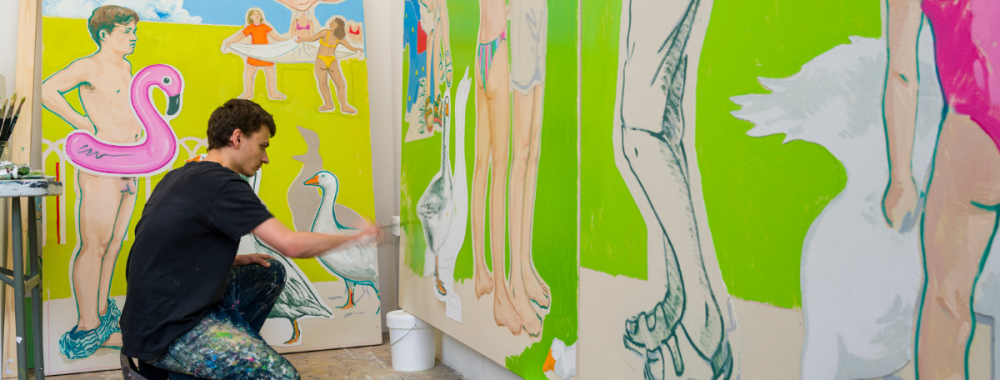
MA FINE ART: COURSE STRUCTURE & CONTENT
A RIGOROUS, CRITICALLY ENGAGED POSTGRADUATE ART COURSE THAT SUPPORTS EXPERIMENTAL PRACTICE AND EXPANSIVE THINKING
The MA Fine Art programme at City & Guilds of London Art School runs from September to September for full-time students, or across two years for those studying part-time. Full-time students are allocated studio spaces on site. Part-time students are expected to maintain their own studio base and have access to the Art School’s workshops and facilities on designated part-time days during term time.
Whether full- or part-time, all students benefit from an intensive teaching model built around studio practice, critical discourse, and professional development. Teaching takes place across a combination of group sessions, 1:1 tutorials, collaborative experiences, lectures, study visits and independent research. Face-to-face sessions are usually scheduled between Mondays and Wednesdays. All students are expected to attend taught sessions and be present for the full duration of the course.
STUDIO PRACTICE: RESEARCH, EXPERIMENTATION, MAKING
The MA Fine Art course begins with a period of creative research and critical reflection, encouraging you to question your assumptions, identify contextual frameworks, and test new directions in your practice.
The course focuses on helping you to develop an ambitious and coherent body of work through critical engagement with materials, processes, and ideas. You’ll be supported to take risks, move beyond established habits, and build momentum in the studio within a structured and dynamic learning environment.
CRITICAL THEORY & REFLECTION
Critical thinking is embedded throughout the course and extends across all aspects of your creative practice. You will explore the contemporary and cultural contexts of your work through a programme of seminars, discussions, and tutorials that engage with current debates in art and visual culture, politics, technology, identity, and more.
These sessions support the development of your Critical Model Dissertation (CMD), an extended written project that explores key themes, methods or questions relevant to your practice. You’ll be guided by a personal dissertation supervisor and participate in a series of workshops and group sessions focused on creative research methods, writing, and critical reflection.
PROFESSIONAL PRACTICE FOR A CHANGING ART WORLD
Professional development is explored through a series of seminars, talks and practical workshops delivered by artists, curators, writers and other practitioners working across diverse areas of contemporary art. Rather than promoting a singular model of success, we look critically at the realities of building a sustainable art practice today — across and beyond the gallery system.
This strand of the course is designed to equip you with tools and insights to navigate the complexity of contemporary art worlds and to define your own future within them.
ASSESSMENT & FINAL PRESENTATION
Assessment takes place through a combination of written and practical submissions. The course culminates in the presentation of your final body of work in a group exhibition context, supported by written reflections and documentation that articulate your critical and material processes. This is a moment to consolidate your learning, share your work and position yourself for life beyond the MA.


